Consortium Review
It would hardly be an insightful observation to say that a lot of videogames revolve around combat. Of course they do: it’s exciting, fast, visceral, and one of the few things you’re not allowed to do without signing several extremely weighty forms and opening yourself up to the possibility of bleeding out alone hundreds of miles from home. Combat, and its beautiful mistress, violence, are the bricks and mortar of gaming, but their inclusion can make for some seriously contrived departures from common sense in the mysterious multiverse that all games occupy. For example, few games will let your opponents unconditionally surrender, and even fewer will let the player do it. Diplomacy is something that happens in dry turn-based strategy games, not on the ground-level with bullets flying past where it would be infinitely more useful. Even Deus Ex, regarded by many as a paragon of freedom of approach and generally one of the greatest games of all time, rarely provided non-violent options beyond the occasional dialogue test or circuitous sneaky route. No, creeping up on a mercenary and jabbing your futuristic cyber-taser into the small of his back does not count as ‘non-violent’. So, my door was wide open when Consortium turned up on the front steps, professing to be the first-person role-playing answer to my somewhat pacifist wishes. To its credit, it even managed to hold my attention for quite some time before the massive internal haemorrhaging began.
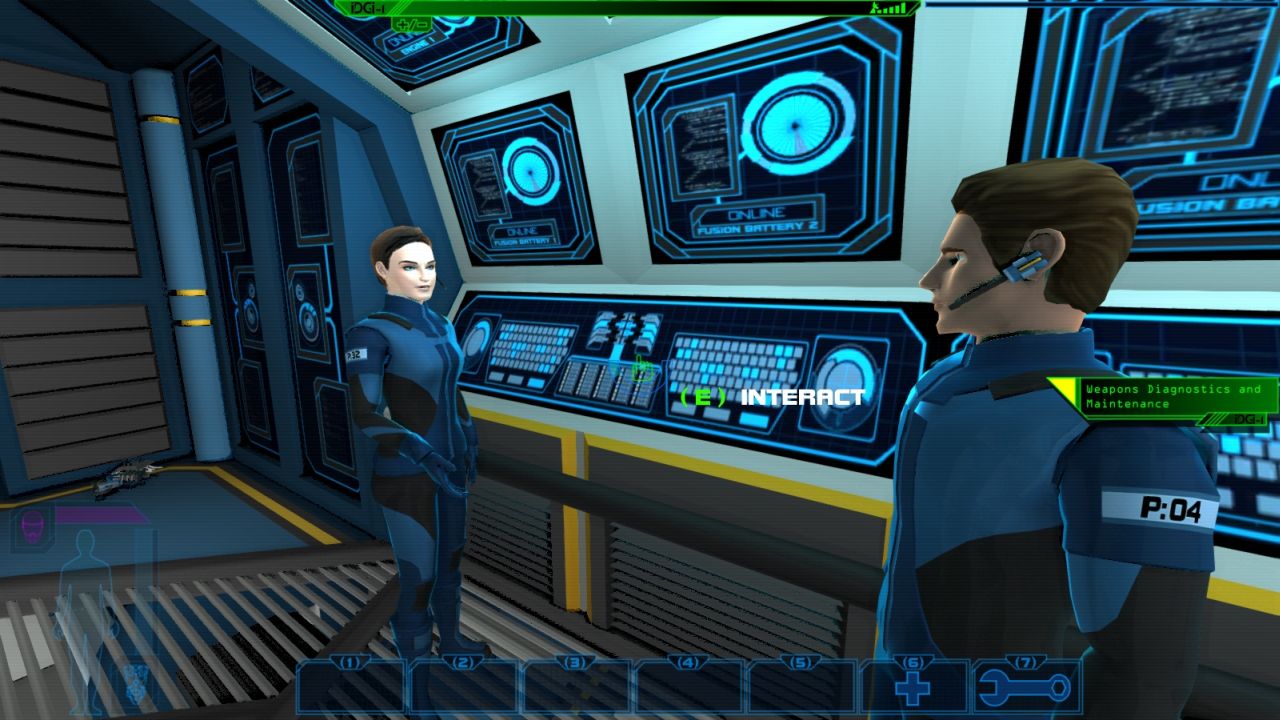
Certainly, Consortium doesn’t waste any time impressing upon you the fact that it’s going to be something a little bit different, for better and for worse. You are Bishop Six, a sort of futuristic bodyguard-stroke-diplomat with some unspecified role in a big nebulous authoritarian body called the Consortium, which took the sensible route of basing its ranking system on chess pieces rather than, say, Monopoly. You’ve been assigned to the spaceship Zenlil, notable for not actually flying into space or being a spaceship (it is, if the view through the windows is anything to go by, just an oversized Airbus with some spacious interior design). Except none of that is true, because you’re actually some prat sitting at a desk, probably procrastinating far too much, and Consortium is strangely keen to acknowledge this as part of the plot. The essential premise, which took one look at the concept of a fourth wall and decided it was above something so petty, is that the game is not a game at all, but a communications interface for an orbiting satellite put in place by the developers. This satellite opens a digital rift to the distant future, allowing you to remotely take control of Bishop Six in an alternate timeline and manipulate him in order to… oh crikey, are you reading this? It’s been a while since I’ve been exposed to science fiction so soft that you could pack it into boxes and use it to mail out fine china.
All gentle ribbing aside, there’s no denying that it’s an interesting framing device for the plot. Unlike, say, Assassin’s Creed, projecting yourself into the body of Bishop Six comes with a few unfortunate side effects, many of which are worked into the gameplay and plot with varying levels of effectiveness. For example, it means that on top of performing your duties as a Bishop you must also conceal your real identity, which becomes a trickier task than it sounds when people start to inquire into your back-story. It just feels like an uncomfortable concept to swallow for an otherwise mostly-immersive game, a little sharp nub of nonsense sitting in the middle of what is otherwise a fairly grounded piece of science fiction. Part of my immersion in any work of fiction stems from the understanding that it takes place, in some way, ‘elsewhere’, because that allows for everything, right down to the fundamental laws of physics, to be bent in the name of narrative freedom. As long as it was made clear that it took place in an alternate reality, you could have Captain Picard and Stephen Fry riding robot unicorns through the Negative Zone on the very first page and I still wouldn’t bat an eye (as a matter of fact, I’d be downright entranced). It’s only when you try and tie the fiction to something in the here-and-now, moreover something I’m quite capable of disassembling and examining in minute detail at any time, that I start to huff and harrumph and make grunting noises of a dissenting nature. I know for a fact that your game isn’t a digital portal, Interdimensional Games, because reality doesn’t bug out this frequently.
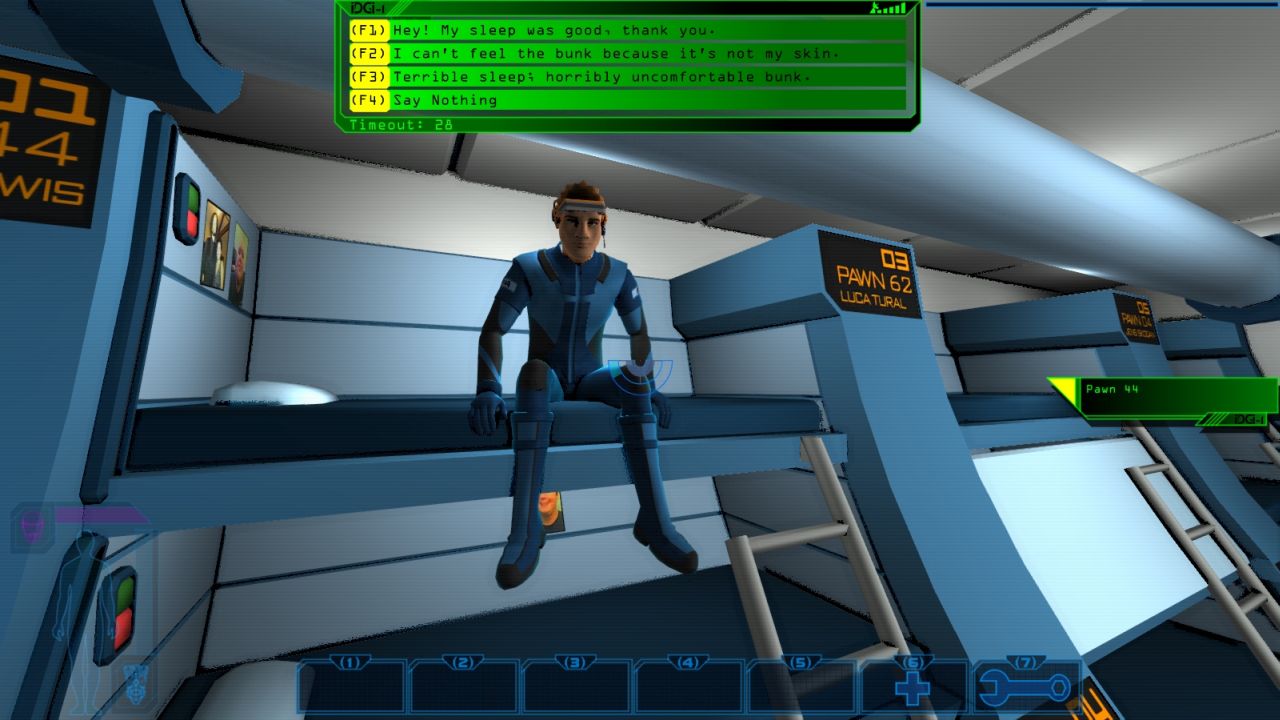
Let us move on under the pretence that you have internalised this abject silliness. Consortium is a role-playing game not in the traditional sense – wherein you must drag half a character sheet along for the ride and pour points into it until you’re better than everybody else at hitting things with a sharpened stick – but in the sense that you playing a character’s role, controlling their development throughout the game and deciding whether they’re a truly terrible person or just a mostly terrible one. Naturally this results in an almost entirely dialogue-powered game, which conceptually I rather like, but it does make the entire thing feel like one long drawn-out intro sequence when it establishes so many combat mechanics and then barely utilises them. An obscene amount of your time is spent aimlessly bumming around the ship while your assorted weapons, inventory and energy systems slowly gather space-dust. It’s nice that the game doesn’t skip on depth, but it just feels poorly focused, as if the majority of the team were working on a far more action-oriented title before the lead designer groggily emerged from his pillow fort and yelled “I’ve changed my mind, we’re cutting ninety percent of the combat to make room for more dialogue trees.”
Another thing I’m not okay with is that the dialogue trees in question don’t seem to have nearly as much of an effect on the path of the story as the game emphasises. You are encouraged to quicksave often, play through multiple times and explore alternate paths, so in the interest of getting the most out of my grubby twenty dollars I organised three separate runs through the whole game: once as an amicable angel, once as a snarky git, and once, taking full advantage of the ‘Say Nothing’ dialogue option, as Gordon Freeman. While the latter two were entertaining in their own way, as the various members of the crew struggled to deal with my antisocial antics, their differences were questionable at best. There are a handful of points in the game where you can make a noticeable difference to the events at hand or spin off into a brief side-show, which is quite admirable in its own way; but the vast majority will just alter the dialogue at hand and your reputation with the various crew members. This is something of a bugbear for me because my reputation didn’t seem to have much of an effect on anything whatsoever. If this was a Mass Effect game I’d want to retain my reputation because it would open up new gameplay options, or grant me extra rewards, or because I secretly fancied a romance-able crew member and wanted to engage in some private galactic diplomacy with them. Consortium doesn’t appear to offer any such incentives, rendering the whole thing essentially useless.
Not that one would willingly try to chat-up the crew members of the Zenlil, anyway. For a game where conversing with your subordinates constitutes such a huge slice of gameplay, a worryingly large percentage of characters are surprisingly bland and interchangeable. There’s a core group of important people who are at least memorable, if not particularly interesting, but everybody else might as well be a set of half-melted shop mannequins with pencilled-in features. They all feel artificial, manufactured, delivering their sterile colloquialism-free lines with the emotional capacity normally reserved for infomercial actors. I won’t blame the voice acting entirely, since it is at least up to a decent standard – apart from having that curious property where every single international accent on the planet is represented among your ranks – but I wouldn’t be surprised if I was told, say, that the writer wasn’t around when the lines were being recorded. The other part of the problem is the crew’s names, in the sense that they aren’t actually used. Everybody is primarily referred to by their rank designation, be it Knight 15 or Rook 9, and associating these often similar titles with people is far harder than it sounds. We have names for a reason, you know: a unique collection of syllables is ideal for identifying somebody’s ugly mug. I wouldn’t mind – since there is, in fairness, a menu option that lists everybody you’ve met so far – but the game wheels out a murder mystery plot early on which practically demands that you be familiar with every single person on board in order to deduce the traitor. Who do I think is more suspicious, Pawn 25 or Pawn 29? Don’t know. Pawn 29 is the one with the single arbitrary forgettable character trait, right? Oh wait, that applies to all of them.
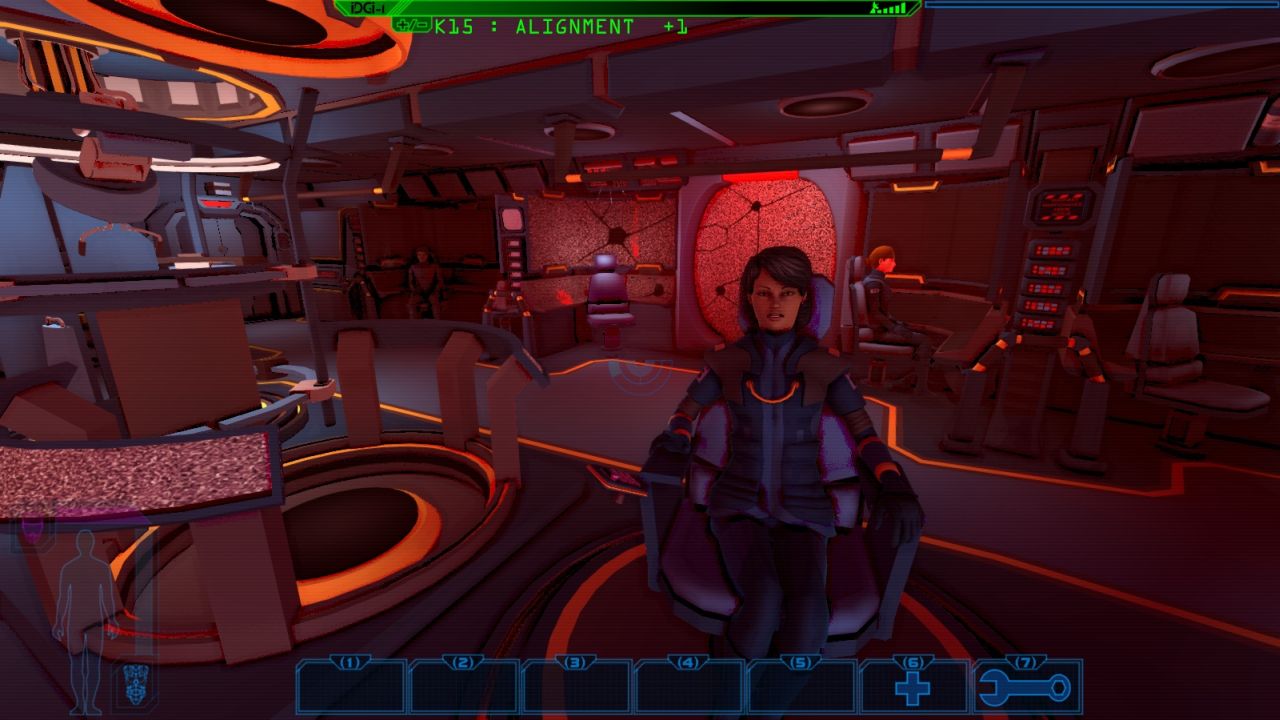
We’re going to edge into petty territory now, so if you’re hoping for some serious grown-up criticism then you might want to put fresh slices of lemon over your eyes for the duration of this paragraph, or whatever it is people do. Ready? Alright. Where, if you please, is the ‘skip dialogue’ button? I’m sorry, Consortium, but your spoken dialogue was not exactly music to my ears to start with, and playing through the game for the fourth time in a row has not sweetened the experience by any measurable amount. I appreciate, nay, admire Interdimensional Games’ endeavours to create a game with multiple narrative paths, and I am as willing to wander down such paths as I was when I played The Stanley Parable, but I need to be met halfway here. The dull pain of repetition needs to be soothed as much as possible, and that starts with not forcing me to sit around for five minutes or so waiting for the same stiff space-opera dramatics to unfold at a painstakingly-slow pace. The Stanley Parable dealt with this sort of thing by being more densely packed than a 6 AM commuter train and – mostly – letting you pass through the story as fast as your legs could carry you. Consortium has neither of those things, meaning that pretty soon you’ll be wondering just how Rook 9 would look with a plasma coil jammed up his left nostril.
As it happens, assaulting your crew is just one of the many things that Consortium just flat-out won’t let you do, alongside opening conveniently locked doors and generally anything that would send the plot careening off its established course, which seems a bit weak and flimsy for a game selling itself so heavily on its freedom of operation. Several times I made a point of trying my absolute hardest to completely throw a playthrough and the game would always find a way to ensure things carried on essentially as they were before. I could just come right out and explain that I was a visitor from another dimension, inhabiting Bishop Six’s body and controlling his actions as part of some twisted entertainment scheme, and after a brief diversion everything returned to normal. I just don’t see why Consortium is so averse to the idea of going ahead with a game-ending scenario. Part of the importance of being able to drive the plot is being able to drive the plot off a cliff if necessary, or to bring it down to a more generalised level: freedom is not freedom without the freedom to royally bugger things up. Consortium is a game that never takes your training wheels off.
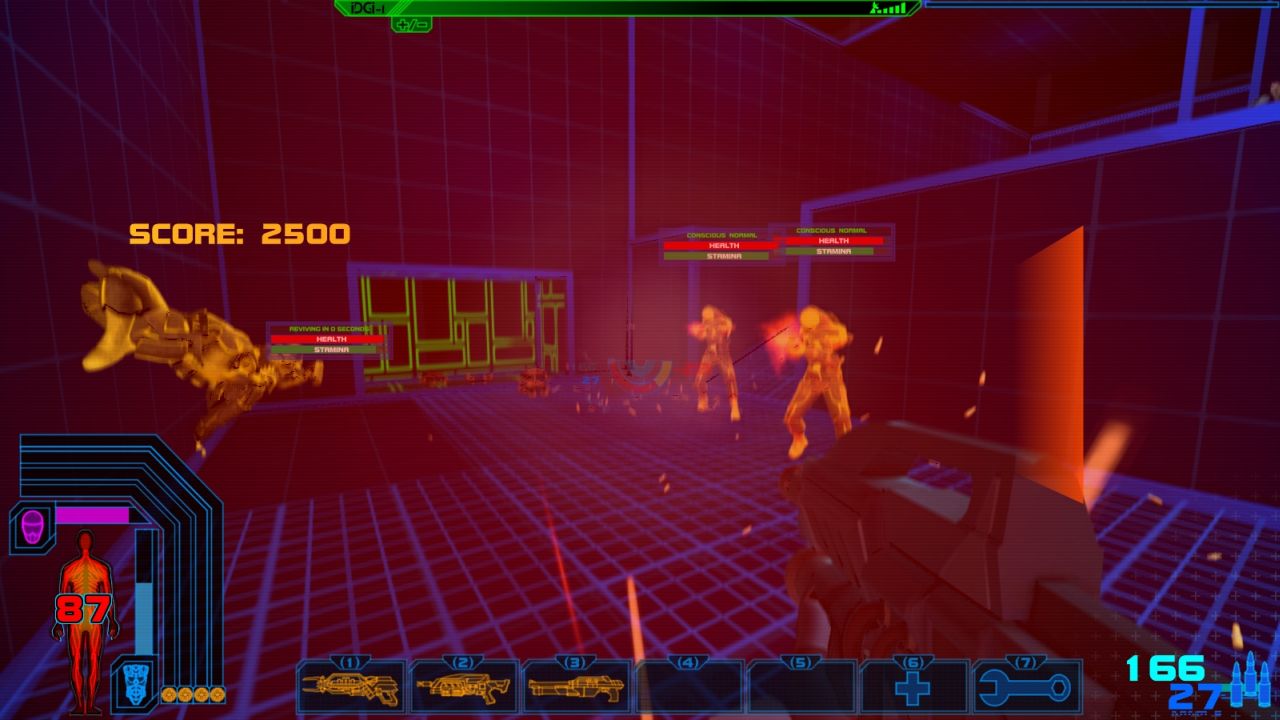
Don’t touch those lemons just yet. In the course of researching this game before its release – because, you know, professionalism and stuff – I came across an interesting little titbit: there are, apparently, over 150,000 words of back-story tucked away in Consortium. This became something of a dubious claim after I’d played through the game twice and found precisely zero of those words, but eventually I ran my fingers over a certain info-screen in the ship’s lobby and… well, it was like I was in a nineties sitcom and I’d just opened somebody’s closet door. I was inundated – no, buried – by a bookshelf’s worth of fabricated newspaper articles, reports, stories and general lore snippets. Sure, it was some impressive attention to detail, but it was far too condensed to be of any use to gameplay. Back-story is something to be weaved into the game, to be offered gently to the player, as one would offer a mint to their dinner date on the way out of the restaurant. Presenting the back-story like this, then, is like dumping a sack full of mints in front of me and sitting opposite, folding your arms meaningfully: I wouldn’t know where to start, and even if I did, that’s a seriously hefty undertaking you’re asking from me there, Consortium.
Let me make it nice and clear that Consortium is not, apart from this unprecedented backstory dump, a badly-written game. The story is definitely compelling, above-average for videogames – at least, when it’s not faffing around with all that alternate reality nonsense – and most of the dialogue rings fairly pleasant in spite of its often-monotonous delivery from plasticine emotion-androids. However, there is one thing that Consortium deserves a good thumping for, and that’s the ending. You know the drill here: spoilers abound, citrus sleeping masks at the ready if you have a problem with that. Anyway, after a relatively stable plot so far, you meet with the King – an AI in charge of running the Consortium – and are made aware of a terrorist operation taking place in London being orchestrated by none other than Sa’ad Bin Laden. With a completely new, conspiracy-theory infused (and slightly tasteless) conflict on the cards and the old ones not quite resolved, things are looking ominously fragmented. You are introduced to a completely new character with no connection to the plot thus far, you arm yourself to the teeth so you can prod some terrorist buttock, bail out the back of the Zenlil in the middle of a storm, quantum leap your way back through key parts of the story and… roll credits. The game goes to all the trouble of making you think it’s going to have an exciting climactic action-packed ending, and then ends on a weakly ambiguous cliffhanger. As disappointments go it’s right up there with getting a Chinese Wii knock-off on Christmas Day and struggling to look grateful for the family photographs, but since this is Interdimensional Games’ first release I suppose I can let them stick their grubby foot in the door for a sequel if it means they can carry on. I’d play a sequel, honestly; if only to see what the developers do next.
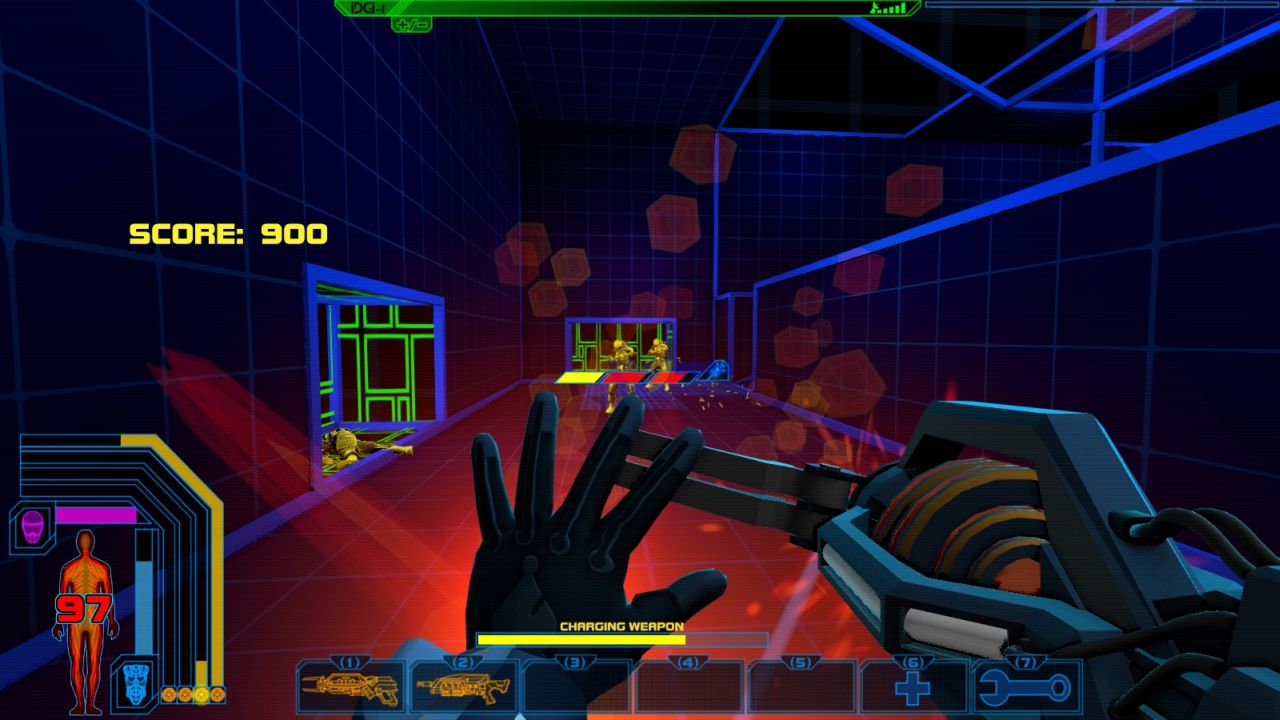
Finally, and perhaps fatally, the game is swimming in a sea of bugs. Most are of the graphical glitch variety – sometimes only subtly distinguishable from the ‘oh look, your magical time satellite is on the blink again’ graphical effects – but a few have risen to the top of the crawling mass, their bodies engorged upon the corpses of their underlings, and have taken the form of game-ending dead-ends. Normally I’d spend some time gleefully recounting their wacky effects upon the game, but my hand was stayed by the news that the developers have not only publicly apologised and sacrificed at least one beta tester at the altar of Kali (okay, I might have remembered that part wrong) but have also hotfixed everything they could in the first week and have set up a bug-fixing process for the next few months. In today’s world, I can respect a developer that not only admits that they ballsed-up, but also immediately sets about righting their wrongs. Consequentially, Interdimensional Games gets to escape humiliation today. Perhaps by the time this review beams itself down your eyeball tubes, the game will be more or less fixed, and perhaps I will also transcend my physical form and become a being of pure spite and bad similes. You never know.
Ultimately though, Consortium is little more than a flawed curiosity. In some ways it emulates that mighty first-person RPG of yore, Deus Ex, but only if the dialogue features had been allowed to grow unchecked, like a cancerous mass, and swiftly engulf everything else that made that game great. It’s a vision of something quite extraordinary, a truly character-driven piece of original science-fiction, but just takes far too many missteps to properly entertain. For a game where story and character are everything, it makes so many amateur mistakes in those key areas: the poorly-defined crew members, the congealed mashed-potato lump of in-game lore, the on-the-rails plot, the occasionally completely broken dialogue trees and the frankly downright silly framing concept are just the largest bugbears to be named. If you’re desperately seeking a non-arty departure from typical action gaming and are prepared to forgive just about anything to get it, then I can recommend Consortium to you. For everybody else, it is but a novelty.
